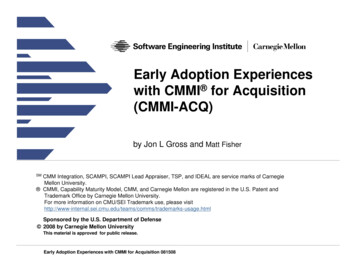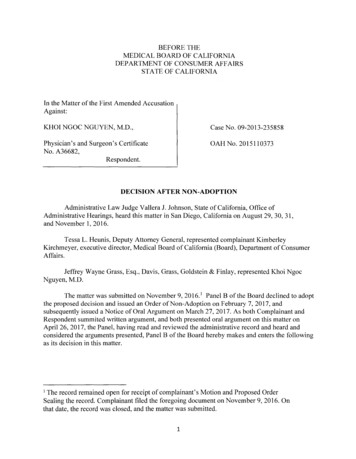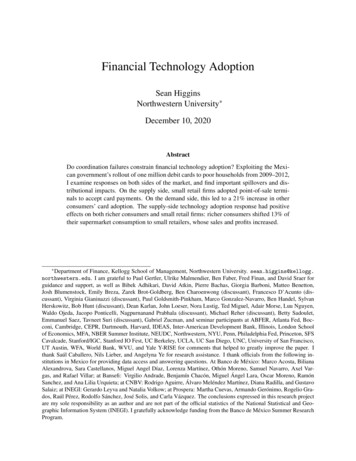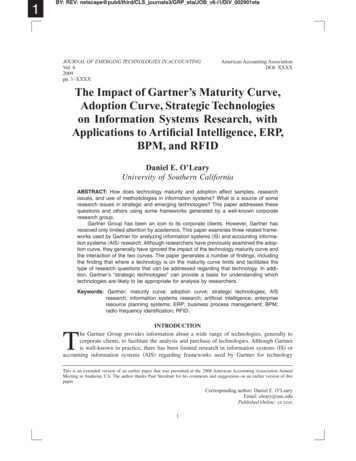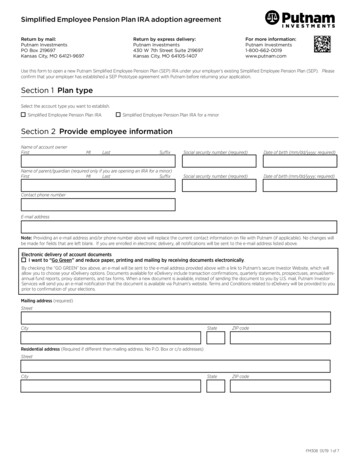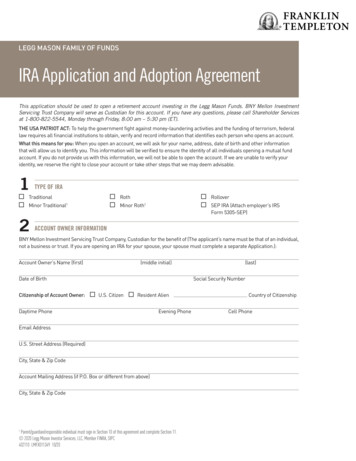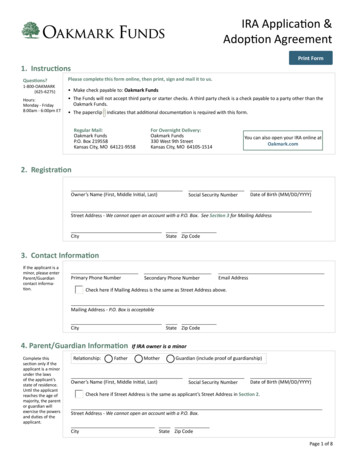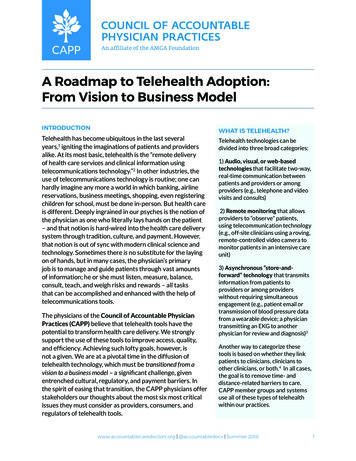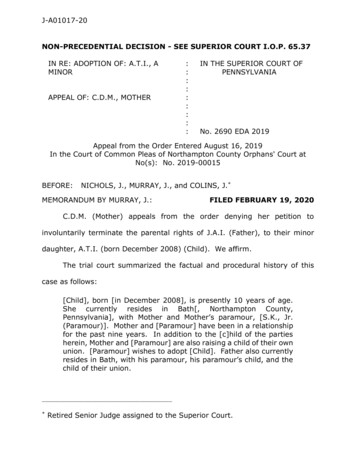
Transcription
J-A01017-20NON-PRECEDENTIAL DECISION - SEE SUPERIOR COURT I.O.P. 65.37IN RE: ADOPTION OF: A.T.I., AMINORAPPEAL OF: C.D.M., MOTHER:::::::::IN THE SUPERIOR COURT OFPENNSYLVANIANo. 2690 EDA 2019Appeal from the Order Entered August 16, 2019In the Court of Common Pleas of Northampton County Orphans' Court atNo(s): No. 2019-00015BEFORE:NICHOLS, J., MURRAY, J., and COLINS, J.*MEMORANDUM BY MURRAY, J.:FILED FEBRUARY 19, 2020C.D.M. (Mother) appeals from the order denying her petition toinvoluntarily terminate the parental rights of J.A.I. (Father), to their minordaughter, A.T.I. (born December 2008) (Child). We affirm.The trial court summarized the factual and procedural history of thiscase as follows:[Child], born [in December 2008], is presently 10 years of age.She currently resides in Bath[, Northampton County,Pennsylvania], with Mother and Mother’s paramour, [S.K., Jr.(Paramour)]. Mother and [Paramour] have been in a relationshipfor the past nine years. In addition to the [c]hild of the partiesherein, Mother and [Paramour] are also raising a child of their ownunion. [Paramour] wishes to adopt [Child]. Father also currentlyresides in Bath, with his paramour, his paramour’s child, and thechild of their union.*Retired Senior Judge assigned to the Superior Court.
J-A01017-20From the time [Child] was under one year of age until she wasapproximately six years of age, she was in the primary custody ofFather. Mother relinquished physical custody of [Child] in herinfancy to Father in order to pursue a military career, though thisintention never came to fruition. During this time, Mother hadlittle contact with [Child] for several years, until [Child] wasapproximately five years of age, when regular contact with Motherresumed. [Child] remained in Father’s primary custody.In August 2014, Father was involved in a serious accident whileat work, resulting in severe burns to his body. As a result, Fatherwas unable to work and eventually found himself bothunemployed and homeless, without any benefits because he hadbeen self-employed. When Father found himself and [Child] livingin close quarters at the home of an acquaintance, Father becameconcerned about the safety of [Child] and decided the bestinterests of [Child] were not being served and that it would bebest if she went to live with Mother for a period of time until hewas able to get back on his feet with a job and housing. Motheragreed to take primary custody of [Child], and the parties agreedthat they would assume a 50/50 custodial schedule when Father’scircumstances improved. Unbeknownst to Father until months orperhaps years later, Mother obtained an emergency custody Orderon September 2, 2014[,] granting her primary legal and physicalcustody of [Child].Father visited with [Child] sporadically after relinquishing physicalcustody to Mother. His last visit with Child was in May 2015. AfterMay 2015, Father attempted to reach Mother and [Child] viatelephone, but Mother did not return Father’s calls and eventuallychanged her telephone number without notifying Father of thechange. Mother also changed residences at some point in themonths after cutting off telephone contact with Father. WhileMother did notify the court of her change of address for purposesof the custody litigation on February 3, 2016, she did not notifyFather.When Father learned that Mother had moved, heattempted to locate her and [Child] by contacting Mother’smother. [Child]’s maternal grandmother related that she, too,was unaware of Mother’s whereabouts. Father being pro se in thecustody litigation, we do not believe it would be reasonable toexpect him to be aware that he might learn Mother’s new addressby consulting the court file. Father testified at trial that after herealized Mother was making [Child] unavailable to him, he wantedto wait until he was able to improve his circumstances to provide-2-
J-A01017-20a good life for [Child] before continuing to pursue his custodialrights in [c]ourt, and that he did not want to continue to pursuelocating Mother out of fear of being accused of harassment.In March 2018, Father felt that he was in a better position toparent [Child] and filed a counseled Petition for Modification. Acustody conference was scheduled for April 19, 2018, at whichFather was not present as a result of his counsel’s failure to informhim of same. On June 6, 2018, Father’s counsel withdrew withoutnotice to Father. On June 11, 2018, an Order of Court was entereddismissing Father’s petition after no one appeared for trial. Fathercredibly related that he was unaware of the scheduled trialbecause of his attorney’s failure to inform him of same. Atpresent, Father has stable employment and housing and is in astable relationship with his paramour, to whom he is engaged andwith whom he is raising two children. He is now ready and willingto parent [Child] and wishes to regain a relationship with her. Hehas created a bedroom for [Child] in his home, and has purchasedgifts for her for all of the holidays and birthdays that they havebeen apart.See Order of the Court, 8/16/19, at 2-5.On February 14, 2019, Mother initiated the underlying action by filing apetition seeking to involuntarily terminate Father’s parental rights pursuant to23 Pa.C.S.A. § 2511(a)(1) and (b). The court held a hearing on July 17, 2019.Mother and Father both testified. Additionally, Father presented the testimonyof K.D., his paramour.At the hearing, Child was represented by Lisa M.Spitale, Esquire, guardian ad litem.1 The court denied the petition on August16, 2019.In her argument before the court, Attorney Spitale averred that there wasno conflict between Child’s best and legal interests. See In re Adoption ofL.B.M., 161 A.3d 172, 183 (Pa. 2017) (plurality); In re T.S., 192 A.3d 1080,1092-93 (Pa. 2018) (holding that a GAL may serve as legal counsel wherethere is no conflict between Child’s best and legal interests). Before this Court,Attorney Spitale has not filed a brief, but a letter joining Mother’s briefrequesting that this Court reverse the order denying the termination petition.1-3-
J-A01017-20Thereafter, Mother filed a motion seeking to reopen the record and forreconsideration of the court’s denial of her petition, seeking to introduce thetestimony of Charles E. Dutko, Jr., Esquire, Father’s custody attorney. Thecourt denied the motion on September 14, 2019.Mother timely filed her notice of appeal and concise statement of errorscomplained of on appeal pursuant to Pa.R.A.P. 1925(a)(2)(i) and (b).On appeal, Mother raises the following issues for our review:A. Should [Father’s] parental rights be terminated in that herefused or failed to perform parental duties for a period of at leastsix months immediately preceding the filing of the terminationpetition?B. Should Father’s [t]estimony that he was waiting for a moresuitable time excuse his failure to perform parental duties?C. Should the record be reopened to admit the testimony ofFather’s custody attorney and to admit the records from thatcustody case?Mother’s Brief at 4 (unnecessary capitalization and suggested answersomitted).We review cases involving the termination of parental rights accordingto the following:The standard of review in termination of parental rights casesrequires appellate courts to accept the findings of fact andcredibility determinations of the trial court if they are supportedby the record. If the factual findings are supported, appellatecourts review to determine if the trial court made an error of lawor abused its discretion. A decision may be reversed for an reasonableness, partiality, prejudice, bias, or ill-will. The trialcourt’s decision, however, should not be reversed merely becausethe record would support a different result. We have previously-4-
J-A01017-20emphasized our deference to trial courts that often have first-handobservations of the parties spanning multiple hearings.In re T.S.M., 71 A.3d 251, 267 (Pa. 2013) (citations and quotations omitted).In addition, termination requires a bifurcated analysis:Initially, the focus is on the conduct of the parent. The partyseeking termination must prove by clear and convincing evidencethat the parent’s conduct satisfies the statutory grounds fortermination delineated in Section 2511(a). Only if the courtdetermines that the parent’s conduct warrants termination of hisor her parental rights does the court engage in the second part ofthe analysis pursuant to Section 2511(b): determination of theneeds and welfare of the child under the standard of best interestsof the child. One major aspect of the needs and welfare analysisconcerns the nature and status of the emotional bond betweenparent and child, with close attention paid to the effect on the childof permanently severing any such bond.In re L.M., 923 A.2d 505, 511 (Pa. Super. 2007) (citations omitted).The relevant subsections of 23 Pa.C.S.A. § 2511 provide:(a)General rule.--The rights of a parent in regard to a childmay be terminated after a petition filed on any of thefollowing grounds:(1) The parent by conduct continuing for a period of at leastsix months immediately preceding the filing of the petitioneither has evidenced a settled purpose of relinquishingparental claim to a child or has refused or failed to performparental duties.***(b) Other considerations.--The court in terminating the rightsof a parent shall give primary consideration to the developmental,physical and emotional needs and welfare of the child. The rightsof a parent shall not be terminated solely on the basis ofenvironmental factors such as inadequate housing, furnishings,income, clothing and medical care if found to be beyond thecontrol of the parent. With respect to any petition filed pursuantto subsection (a)(1), (6) or (8), the court shall not consider any-5-
J-A01017-20efforts by the parent to remedy the conditions described thereinwhich are first initiated subsequent to the giving of notice of thefiling of the petition.23 Pa.C.S.A. § 2511.With regard to petitions filed under Section 2511(a)(1),[t]o satisfy the requirements of Section 2511(a)(1), the movingparty must produce clear and convincing evidence of conduct,sustained for at least the six months prior to the filing of thetermination petition, which reveals a settled intent to relinquishparental claim to a child or a refusal or failure to perform parentalduties. In addition,Section 2511 does not require that the parent demonstrateboth a settled purpose of relinquishing parental claim to achild and refusal or failure to perform parentalduties. Accordingly, parental rights may be terminatedpursuant to Section 2511(a)(1) if the parent eitherdemonstrates a settled purpose of relinquishing parentalclaim to a child or fails to perform parental duties.Once the evidence establishes a failure to perform parentalduties or a settled purpose of relinquishing parental rights,the court must engage in three lines of inquiry: (1) theparent’s explanation for his or her conduct; (2) the postabandonment contact between parent and child; and (3)consideration of the effect of termination of parental rightson the child pursuant to Section 2511(b).In re Z.S.W., 946 A.2d 726, 730 (Pa. Super. 2008) (internal citationsomitted).As to the six month period, this Court has stated:[I]t is the six months immediately preceding the filing of thepetition that is most critical to our analysis. However, the trialcourt must consider the whole history of a given case and notmechanically apply the six-month statutory provisions, butinstead consider the individual circumstances of each case.-6-
J-A01017-20In re D.J.S., 737 A.2d 283, 286 (Pa. Super. 1999) (citations omitted). Thecourt must “examine the individual circumstances of each case and considerall explanations offered by the parent facing termination of his or her parentalrights, to determine if the evidence, in light of the totality of thecircumstances, clearly warrants the involuntary termination.” In re B., N.M.,856 A.2d 847, 855 (Pa. Super. 2004), appeal denied, 872 A.2d 1200 (Pa.2005) (citation omitted).Regarding the definition of “parental duties,” this Court has stated:There is no simple or easy definition of parental duties. Parentalduty is best understood in relation to the needs of a child. A childneeds love, protection, guidance, and support. These needs,physical and emotional, cannot be met by a merely passiveinterest in the development of the child. Thus, this Court has heldthat the parental obligation is a positive duty which requiresaffirmative performance.This affirmative duty encompasses more than a financialobligation; it requires continuing interest in the child and agenuine effort to maintain communication and association withthe child.Because a child needs more than a benefactor, parental dutyrequires that a parent exert himself to take and maintain a placeof importance in the child’s life.Parental duty requires that the parent act affirmatively with goodfaith interest and effort, and not yield to every problem, in orderto maintain the parent-child relationship to the best of his or herability, even in difficult circumstances. A parent must utilize allavailable resources to preserve the parental relationship, andmust exercise reasonable firmness in resisting obstacles placed inthe path of maintaining the parent-child relationship. Parentalrights are not preserved by waiting for a more suitable orconvenient time to perform one’s parental responsibilities whileothers provide the child with . . . her physical and emotionalneeds.-7-
J-A01017-20In re B., N.M., 856 A.2d at 855 (citations omitted).We address Mother’s first two issues concerning Section 2511(a)together. Mother argues that Father has not had communication with Childsince May 2015, and has done nothing meaningful to perform his parentalduties. See Mother’s Brief at 14. Mother argues that Father did not makeany attempt to discover Mother’s address, and his sole attempt to re-establisha relationship with Child was the filing of a custody modification petition in2018. Id. Mother argues that Father’s excuses, including his claim that hisattorney did not communicate with him, and that he was waiting for a moresuitable time to resume a relationship with Child, are unbelievable. Id. at 1418.However, the trial court opined:The [c]ourt finds it commendable that Father recognized theinappropriateness of his living situation for a young girl andreached out to Mother to provide [Child] with a more suitableliving arrangement. While Father had an affirmative duty tomaintain his relationship with [Child] during the time that he wasworking to get back on his feet, his best attempts to do so werethwarted by Mother. In considering a parent’s absence from achild’s life, we “must consider the non-custodial parent’sexplanation, if any, for the apparent neglect [of parental duty],including situations in which a custodial parent has deliberatelycreated obstacles and has by devious means erected barriersintended to impede free communication and regular associationbetween the non-custodial parent and his or her child.” In re B.,N.M., [856 A.2d 847,] 855-856. It is clear to the [c]ourt in thiscase that Mother, while not taking extreme measures to hide[Child] from Father, did take actions to thwart the relationshipbetween [Child] and Father by making herself and [Child]disappear from Father’s life. With respect to Father’s attempts topreserve his relationship with [Child], his “performance must bemeasured in light of what would be expected of an individual in-8-
J-A01017-20circumstances which the parent under examination finds[himself].” In re Adoption of Sabrina, 47 A.2d 624, 627 (Pa.Super. 1984). Under the circumstances of the case, we believethat Father did as much as he was capable of doing in order tomaintain a relationship with [Child]. Mother clearly worked tointerfere with the relationship between Father and [Child], takingadvantage of Father’s circumstances to shut Father out of [Child]’slife. Mother changed her address without directly notifying Father,and even cut off contact with her own mother, making it moredifficult for Father to locate her and [Child]. We find it quite tellingthat Mother testified at trial that she did not think that it wasimportant for Father to have a role in [Child]’s life.We accordingly find that Father exercised reasonable firmnessunder the circumstances in maintaining a relationship with [Child],and thus find that Mother has failed to meet her burden of proving,by clear and convincing evidence, that Father’s parental rightsshould be terminated. In re G.P.-R., 851 A.2d 967, 976 (Pa.Super. 2004).Trial Court Opinion, 8/16/19, at 5-7.The court’s findings are supported by the record. Mother’s argument isessentially a challenge to the weight the trial court placed upon certainevidence, and a challenge to the trial court’s credibility determinations. It iswell-settled that this Court may not re-weigh evidence. T.S.M., 71 A.3d at267.Thus, consistent with the foregoing, we discern no error in the trialcourt’s determination that Mother failed to prove by clear and convincingevidence that termination was warranted. B., N.M., 856 A.2d at 855.In Mother’s second issue, she contends that the court erred in denyingher request to open the record, admit the testimony of Father’s attorney, andadmit custody records. See Mother’s Brief at 21-22. Mother argues that itwas “unreasonable” for the trial court to credit Father’s testimony about hisattorney’s failure to communicate with him. Id. Mother cites generally to law-9-
J-A01017-20regarding post-trial motions and the admission of post-trial evidence in civiland criminal cases, but does not cite to cases involving orphans’ court,domestic relations, or involuntary termination of parental rights. Id. at 22.The trial court rebutted Mother’s claim as follows:Mother asserts no legal authority for an entitlement to open therecord – nor is the [c]ourt aware of any such authority – butmerely argues that she should have been permitted to do so afterthe issuance of our August 16, 2019 Order, to offer evidencecontrary to Father’s testimony. If Mother was surprised byFather’s testimony and wished to offer evidence in rebuttal, shewas certainly aware of his testimony prior to the conclusion of thetrial and could have requested an adjournment at that time inorder to gather the necessary evidence, but did not do so. Motherhad her day in [c]ourt to present all of the evidence she felt thatshe needed to present in order to prevail on her petition, and isnot entitled to reopen the record simply because she does notagree with the [c]ourt’s conclusion. Notably, Mother is not foreverforeclosed from seeking termination of Father’s parental rights,and we specifically noted that she may file a new petition afterone year if Father continued to be absent from [Child’s] life.Mother’s apparent position that her rights have somehow beenviolated or that a great injustice has been done by our refusal toterminate Father’s parental rights at this time plainly echoes heractions in thwarting Father’s attempts to see [Child] over the lastfour years – and supports our conclusion that those actions wereintentional – as well as her statement at trial that Father did nothave an important role to fulfill in [Child’s] life, and is entirelymisplaced. Nothing is lost by permitting Father a modicum ofadditional time to reconnect with [Child] and perform parentalduties, now that he has recovered physically and financially andhas retained capable counsel. Conversely, much could be lost byterminating Father’s parental rights in a case where the record isfar from clear that such action is warranted.Trial Court Opinion, 9/16/19, at 2-4.- 10 -
J-A01017-20Again, we see no error in the trial court’s determination, and thusconclude that Mother’s issue regarding her request to re-open the record doesnot merit relief. T.S.M., 71 A.3d at 267.Order
of K.D., his paramour. At the hearing, Child was represented by Lisa M. Spitale, Esquire, guardian ad litem.1 The court denied the petition on August 16, 2019. _ 1 In her argument before the court, Attorney Spitale

